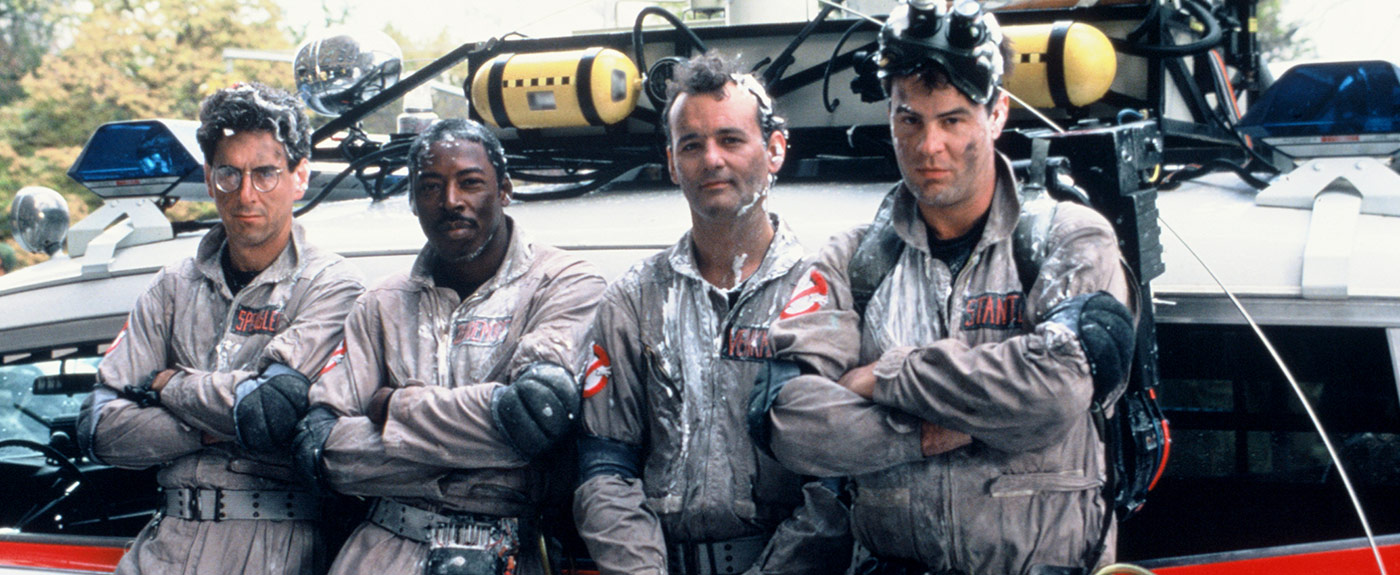A Spooky Startup Story: Ghostbusters
v0.9
by David Harrison / @trawg
New York has a problem.
It's the 80s. New York has a problem. Little old ladies are getting harassed. In libraries.
Not by the thugs or criminals that you might expect of this giant metropolis. By something else. Something new.
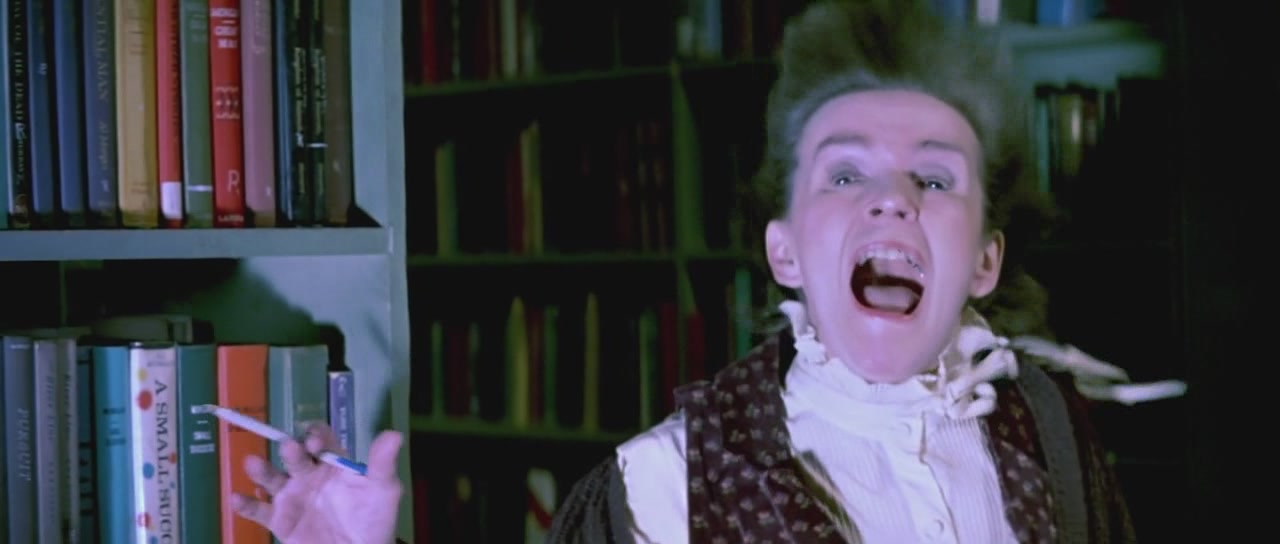
Ghosts
Strange things are happening. Books moving themselves between shelves. Library cards flying all over the place (consult a history book to find out what library cards are). But worst of all, we've got actual ghosts that are scaring the living shit out of people.
There's a brand new problem in the world, desperately in need of a solution. Who will step up to deal with it?

The founding team
As fate would have it, there are people that have a unique combination of skills, knowledge and enthusiasm, and they've been butting their heads against this problem space for a while.
They don't know it yet, but they're about to embark on a startup ride. Let's meet them.
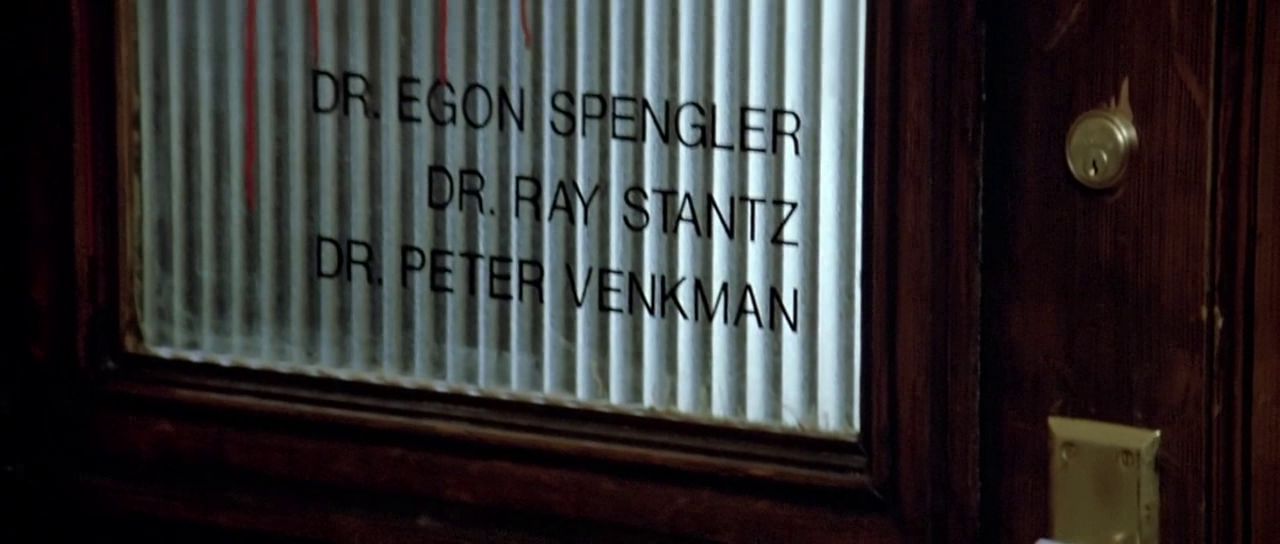
Dr Peter Venkman
He's got PhDs in parapsychology AND psychology. His approach to science has not won him the respect of his peers.
But he's a hustler. He's charismatic and makes things happen. Perfect for client-facing work - standard business development manager type.
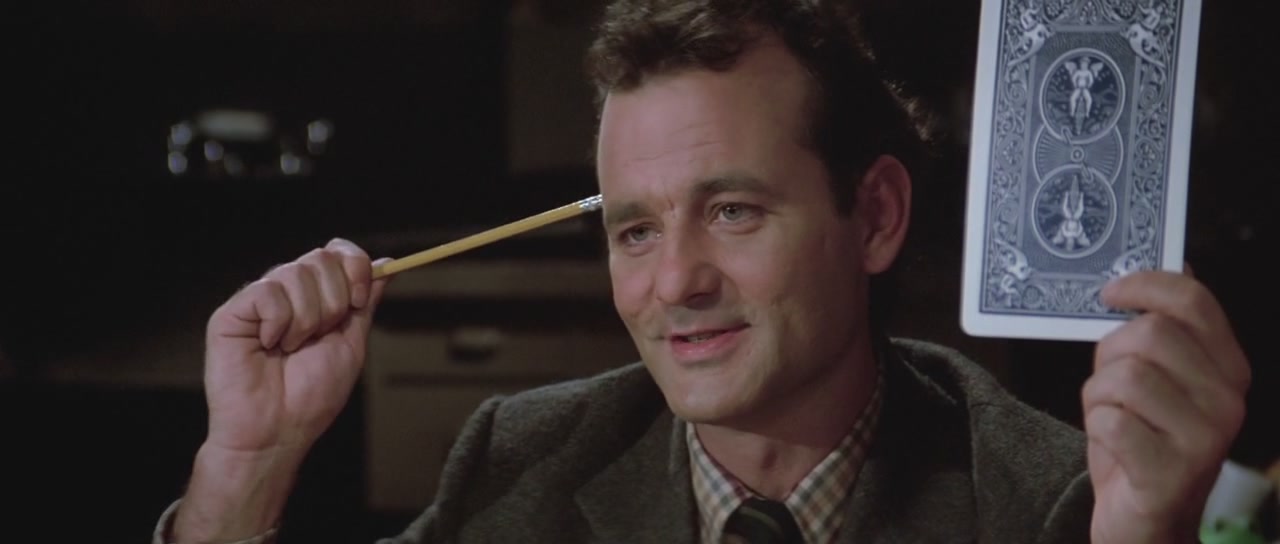
Dr Raymond Stantz
He's smart. He knows his stuff. He's super enthusiastic about, well, everything.
He can also talk the talk; he's more on the technical side but if you throw him in front of a client he knows what to do.

Dr Egon Spengler
The technical co-founder. Obsessive, focused, and stereotypically bad with humans.
He still has useful contributions on the business side as well, but his place on the team is in the lab.
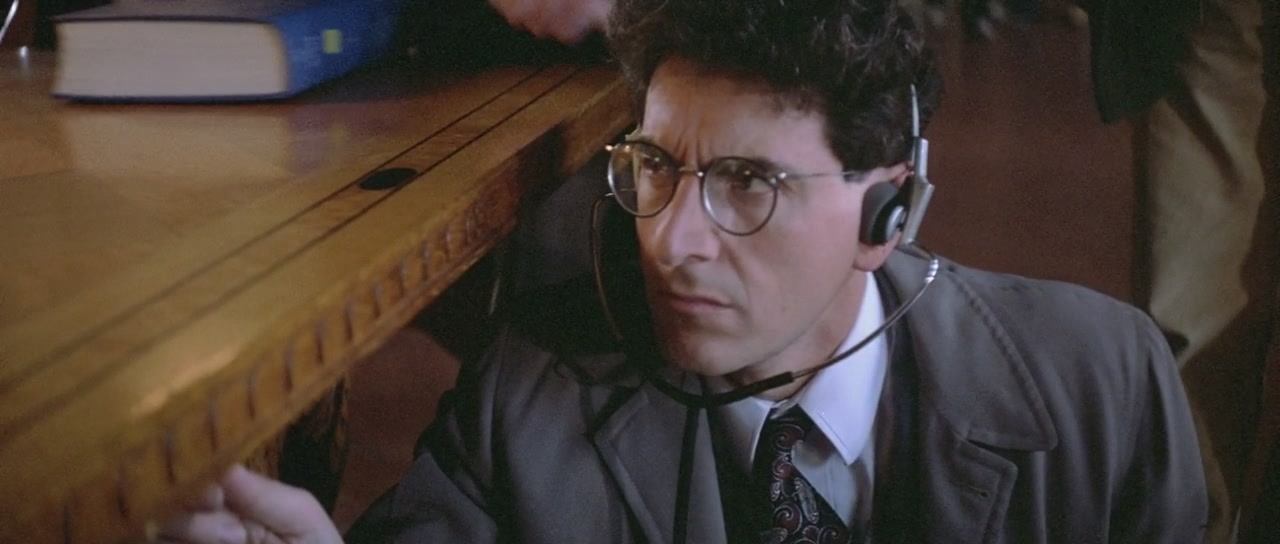
Calm before the storm
At this point what they've been working on has really just been an academic, theoretical problem. Not only has it not yet become a business opportunity, but it's barely something that's even grounded in any sort of reality. They don't know it yet, but what they're doing is meeting a potential client.
Assumptions & evidence
They're about to embark on one of the first steps from the startup playbook - validate assumptions.
And lo, off they go to check out the report from the New York Public Library about ghosts. They're going to see if this is real and to collect some evidence to support their forming hypotheses. To the library!

First steps
They talk to the library staff. Without realising it, they're having their first meeting with a potential client - people with a problem that they can't fix themselves.
After talking to the staff and developing some initial impressions, it's clear something is up. The team heads to the scene, equipment at the ready.
Downstairs
The two technical guys are focused. They're gathering data.
Biz guy knows he needs to be there, but has no idea what is going on. His face shows how much he wants to be there - but also that he doesn't see how he can contribute to whatever is going on.
First contact
There's a few clues - splatters of ectoplasm, inhuman book stacks - they see it. An actual ghost. Real, incontrovertible evidence that what they've been working on their whole lives is undergoing a massive paradigm shift.
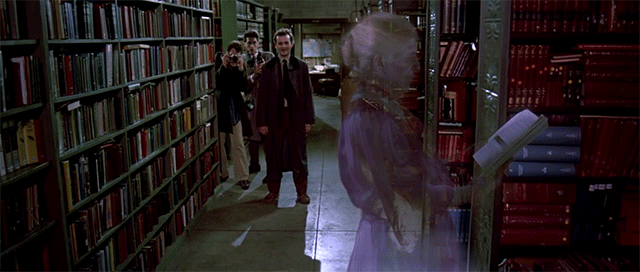
The change
Everything is changing. They're realising they're on the cusp of something new - and not only that they're the first ones to the party.
And like many changes, it is accompanied with a strong sense of terror and dread.
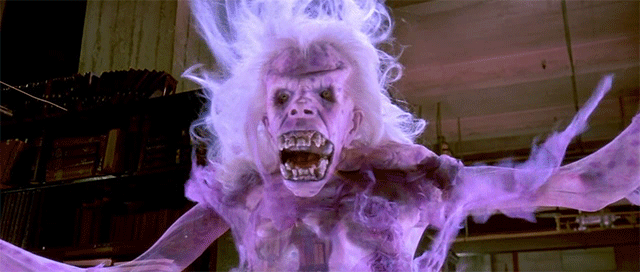
Knowledge & wonder
Their foray into the library has been productive. Egon reveals that not only did they bear witness to something incredible, but they gathered data that indicates they can take things in a whole new direction.
In classic academic style, Ray is excited by the discovery, thinking about the new papers that can be written, the grants that can be applied for and the seemingly inevitable new flow of funding and publications that mark success in the world of academia.
Growing realisation
But Venkman is struck by a different realisation. In that moment, the expression on his face changes as he glimpses a new future, the seed of a plan crystallising. He casts a furtive look around to make sure noone else is listening, protecting it from casual intellectual property theft.
Catalyst
Venkman's moment of inspiration could have instantly been forgotten if not for what happens next. They return to the university, only to discover their offices are being packed up. The Dean informs them that their funding has been cut off. A lack of tangible results has finally caught up with them - completely unsurprising, really.
(Sadly for the dean, their department, and the university, they don't realise that the team have just made one of the biggest breakthroughs of all time.)
But this is just what the team needs.
... to go into business
Venkman and Stantz talk and drink. Venkman realises that his vision wasn't just an idle idea - it's their destiny. He infects Stantz with his vision - despite his misgivings about leaving cozy academia and disrupting the status quo, it's clear he wants to do something with this new knowledge.
First roadblock
The highs and lows they've experienced in only a few short hours! Great discoveries. Turfed out, literally onto the street by their employer. The realisation that their knowledge, their skills, now has a new commercial value that didn't exist until today.
Only one problem, which Ray is quick to point out - they need bread. What they want to do requires financial support. The guys are used to having the university deal with the boring money stuff.
Bootstrapping
Fortunately, we're not subject to watching them go through a typical startup fundraising process in anything like real time. After initially raising the question of where they're going to get the money, Stantz re-mortgages his house, raising the necessary cash for the team to get their startup off the ground.
Lean
Their office search embodies the lean startup spirit - they're looking at the cheapest, skankiest place they can find. Egon points out flaws - or possibly is just being a cunning negotiator. But Ray's obvious enthusiasm wins the day.
Biz Guy
A note on Venkman: even though he seemed casually dismissive of Stantz's concerns about the money and his mortgage, he's clearly thinking hard about every cent they're spending. Stantz's enthusiasm overshadows his awareness about anything to do with the financials, but Venkman - biz guy - is thinking about it.
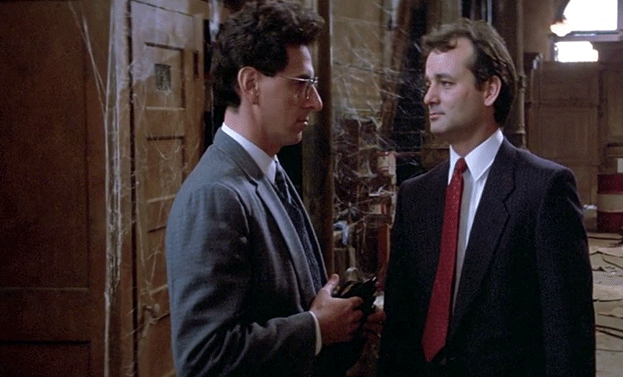
Meanwhile
An apartment on Central Park. Dana Barrett gets out of a yellow cab, laden with groceries. She enters her building, part of a comfortable routine. We meet her slightly eccentric neighbour. She unpacks her groceries. We get a brief glimpse of her life in a world where everything is normal.
Until now.
Eggs start boiling in their shells, exploding out of their carton. A disturbing noise emanates from the fridge. She opens it, to find a fiery landscape inhabited by a demon. She has a problem.
Marketing
We also get our first glimpse of the team in their low-budget TV ad - the first time we hear the word Ghostbusters - demonstrating their frugal approach to marketing (another startup classic).
Speaking of low budget
We're reminded again that Venkman worries about their cash position. Stantz rocks up with a clunker that has a laundry list of problems. When he hears what was paid, Venkman's facial expression tells the story.
Open for business
The Ghostbusters are open for business! They've done all the boring paperwork to get incorporated. They've got a lease on a building. Egon has been hard at work in the background doing nerd stuff - building and testing. They've got their first hire - Janine, the receptionist. They've bought a car, opened bank accounts, bought filing cabinets - in short, done the boring things you need to do to give birth to a company in the great state of New York.
Fortunately, unlike in real startup life, we the audience were lucky enough to skip that process. But they weren't.
Only one problem: The Quiet.
The Quiet
Despite all their hard work, nothing is going on. No customers are walking through the door. Their marketing budget - part of their dwindling cash reserves - seems to have failed to make an impression; noone has called their number from their home-produced commercial.
Until Dana rocks up.
First lead
A walk-in customer is not something that today's tech startup has to deal with. But when it happens, you pay attention. Dana doesn't want to be in this crappy neighbourhood walking into this building that looks like it's about to collapse. But she's got nowhere else to go.
Venkman overhears her talking to Janine. With the natural instinct of a hustler, he switches immediately into charm mode. Before Dana knows it, she's talking to an actual cofounder, demonstrating to her that he has a deep, personal interest in wanting to help her out.
Impress
He knows he has to impress: they desperately need this first client. He casually notes that her weird story is literally their bread and butter - knowing that embellishing the truth a bit, to the eye-rolling hilarity of Janine, might help seal the deal.
Touch Optimized
There's an initial consult with the technical team - Ray and Egon - to see if she's a real, viable, potential client. She passes the test, and Venkman is dispatched to Dana's apartment with the tools.
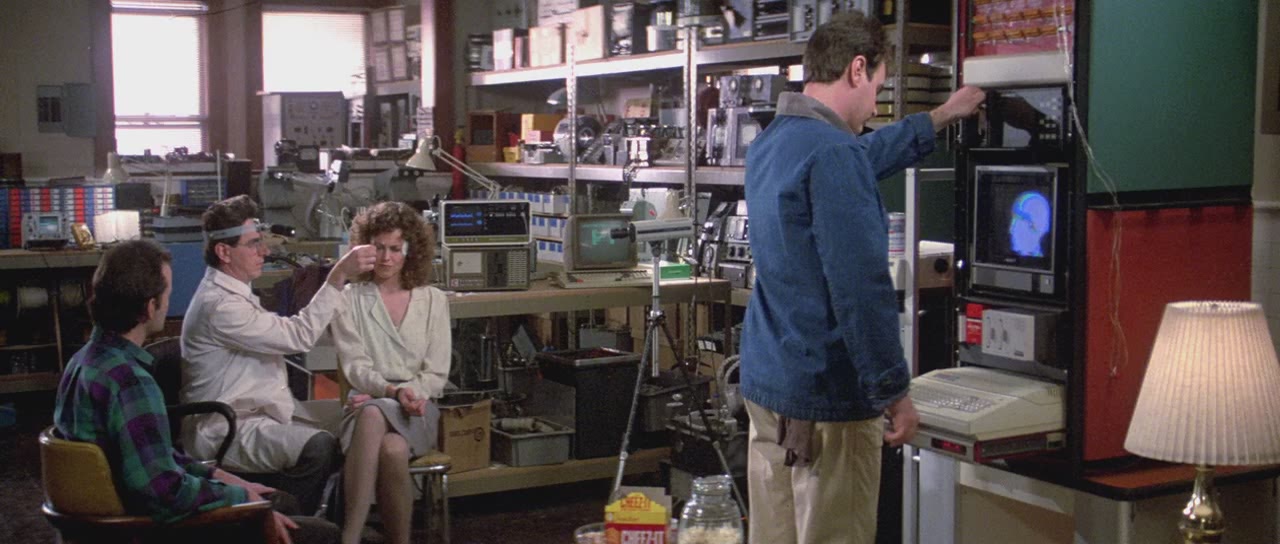
The right track
Venkman doesn't find anything. (Worse, he risks alienating the customer by hitting on her.) But it's a start. The team celebrates the opening of their sales pipeline with takeout, toasting their customer with beers.
The financial squeeze
But we're instantly reminded that they're nowhere near cash flow positive yet. They're working late, eating in the office. In the background is an unmade bed - some of them are actually living in the office! Their next words hammer in their dire financial position.
The Call
But just when things are looking dire - they get The Call. Janine is also working late. She answers the phone. Until now we've only seen a bored countenance; she's just at work to get paid. But we see her excitement grow as the conversation continues. The founders have obviously done a great job infecting her with their vision - she really wants things to happen for the company. She's part of the team.
Before they know it, they're on their feet and rolling out. Venkman - ever-vigilant about expenses and not wanting to waste anything - takes his food with him.
The Call
(Aside: we see in the background that they've spent some of their cash on arcade machines. Classic startup.)
Making an impression
Their first public appearance. They know they've got to make a splash; Venkman takes the lead, entering with flair. They will be remembered (for better or for worse). But they're on to something here - they've arrived fully tooled-up, the output of Egon's engineering strapped to their backs.
Assuring the client
They've gotten their foot in the door. Their customer has a big problem, but they don't want to do anything to blow it yet. Ray exudes confidence, to the pleased surprise of Venkman, who figured he'd be shouldering that burden.
The task ahead.
Once alone, the team are immediately faced with the enormity of the task ahead. Their faces show that it's make or break time - all their swagger, all their work, all their innovation has lead to this moment, and now they have to prove themselves.
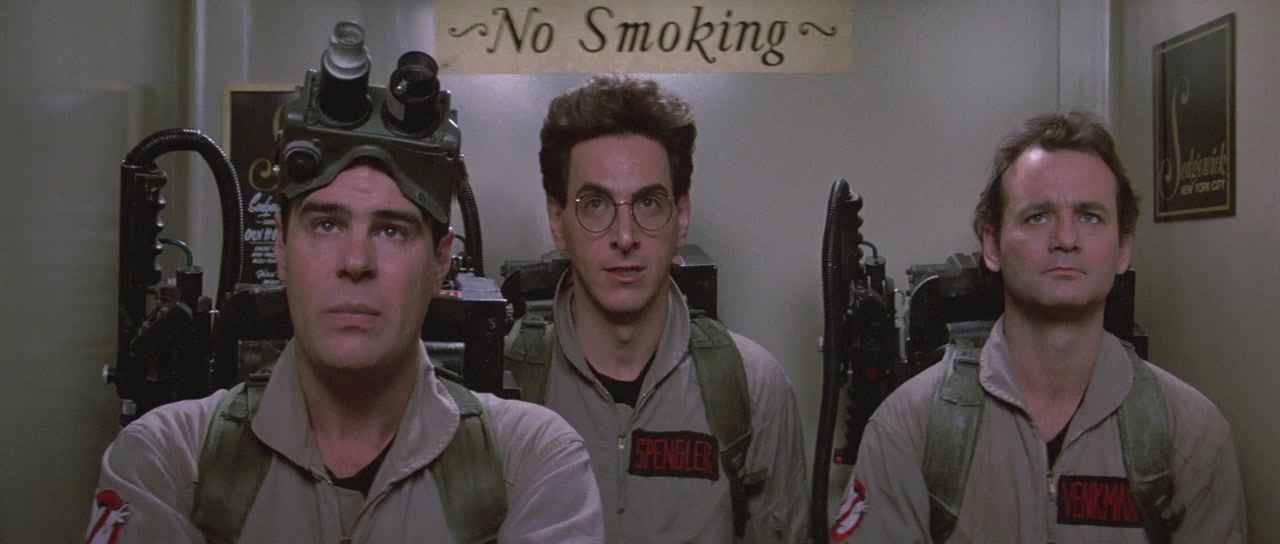
Aside: regulations & licensing
The elevator chat shows they're still lean. They're working with prototypes, MVPs that've been hacked together in the best startup fashion of Just Making Something That Kind of Works Enough We Hope. Ray - nervous - reminds them that they've not tested them that well.
Venkman notes their gear is unlicensed - they've almost certainly skipped a lot of the boring paperwork and regulatory hurdles that they would have done if they were a giant company. They probably don't even have patents on any of their unique hardware.
Their goal was to make some gear that would get the job done. Everything else has been secondary.
Trial by fire
What follows is a cinematic masterpiece. But the important part is this is their trial by fire. Things don't go perfectly - housekeeping trolleys are destroyed, staff are terrorised, walls are flambed, Ghostbusters are slimed.
Engineering belatedly reminds sales and bizdev about a critical flaw in their gear ("don't cross the streams") - saving them from potentially blowing their first gig.
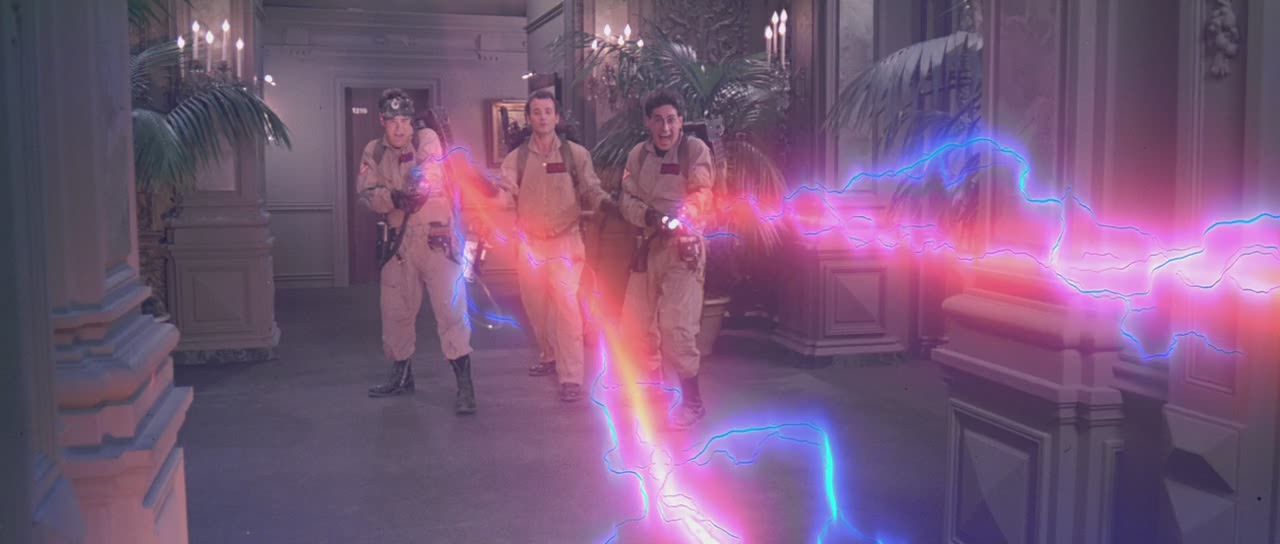
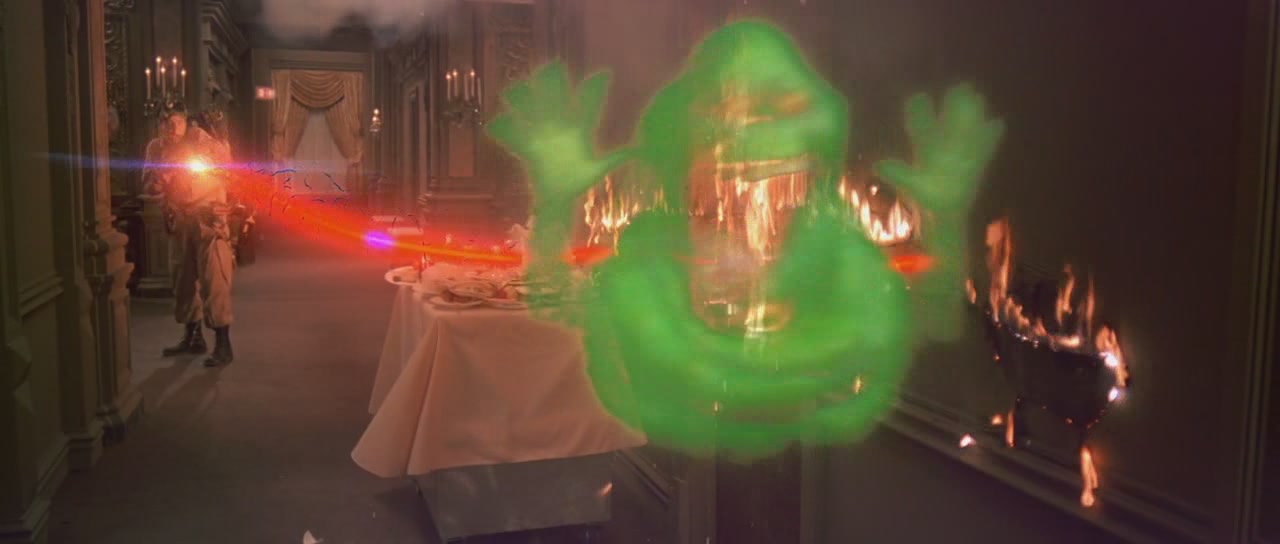
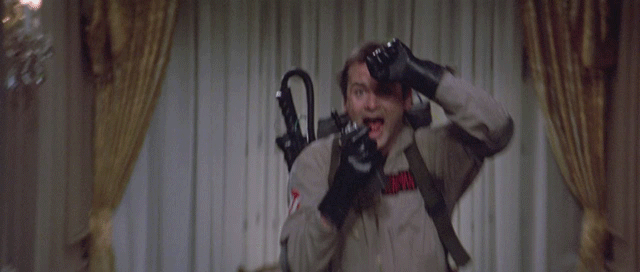
First Victory
Just when the client was losing confidence - success.
Closing
Flushed with success, the team seal the deal. They're literally creating a new industry here - they've only just really figured out what the product/market fit is, and don't really know how the supply/demand side is going to work.
They come up with pricing model on the fly. The customer pushes back, but the team know he's over a barrel: instant vendor lock-in. Supply and demand is way out of wack, and they're taking advantage of it while they can.
The Wild Ride
A montage. The roller coaster ride of success. They've got more work than they know what to do with. They're the heroes saving the city from this new terror and everything is just swell. Business is so good they need another pair of hands; Winston Zeddemore gets the job.
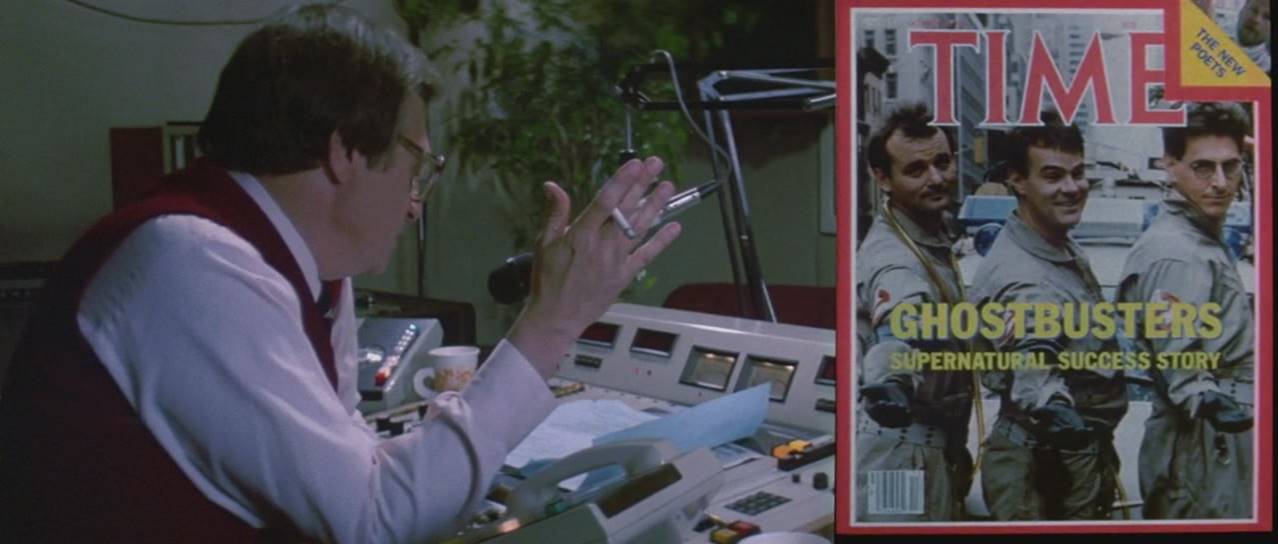
Working the pipeline
But despite their new found fame, fortune, and frantic work life, the team haven't forgotten about Dana. She's still in their sales pipeline - she's got a problem that's right up their alley, but one they haven't figured out how to resolve with their current set of tools, services, and systems. But they want to.
Venkman tracks her down and reveals what they've figured out so far (while angling for a date, successfully as it turns out - sometimes business can mix with pleasure). But the team is about to start running into a few roadblocks.
Scaling grief
They're trying hard to scale to deal with their new workload. Zeddemore has come on board to help deal with the shortage in the field. Janine is struggling in the office, and is not happy about it. Venkman provides a classic example of a kind of management failure that causes employee morale to slip.
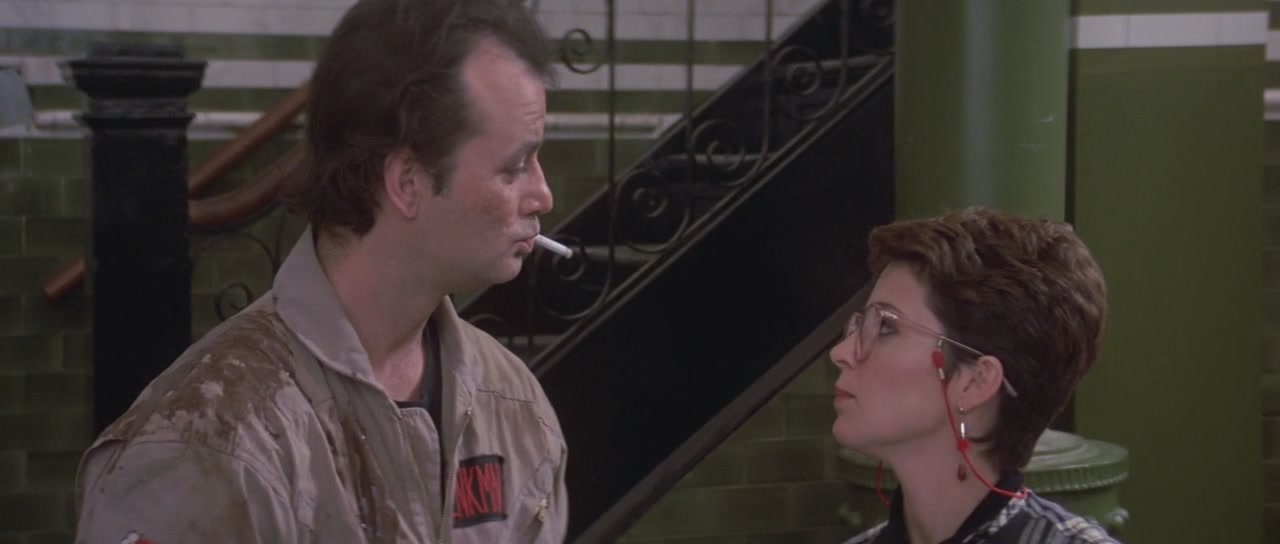
The wrong side of the law
 Their next problem is scarier. The law has come knocking.
Their lack of paperwork in the early days is coming back to bite them. The Environmental Protection Agency is worried that they're exposing the city to risk.
Their next problem is scarier. The law has come knocking.
Their lack of paperwork in the early days is coming back to bite them. The Environmental Protection Agency is worried that they're exposing the city to risk.
Venkman, grumpy from another hard day, deals with it gracelessly, throwing the EPA agent out. Classic case of slow moving government not keeping up with technology, trying to enforce out-of-date laws on these new ambitious companies that are braving new frontiers.
Technical problems
As if that wasn't enough, Egon is worried. He's been crunching the data. Their containment grid is struggling, an issue that they didn't have to worry about with one or two ghosts in there, but now they're hitting the ceiling on their technology. And there's something big on the horizon.
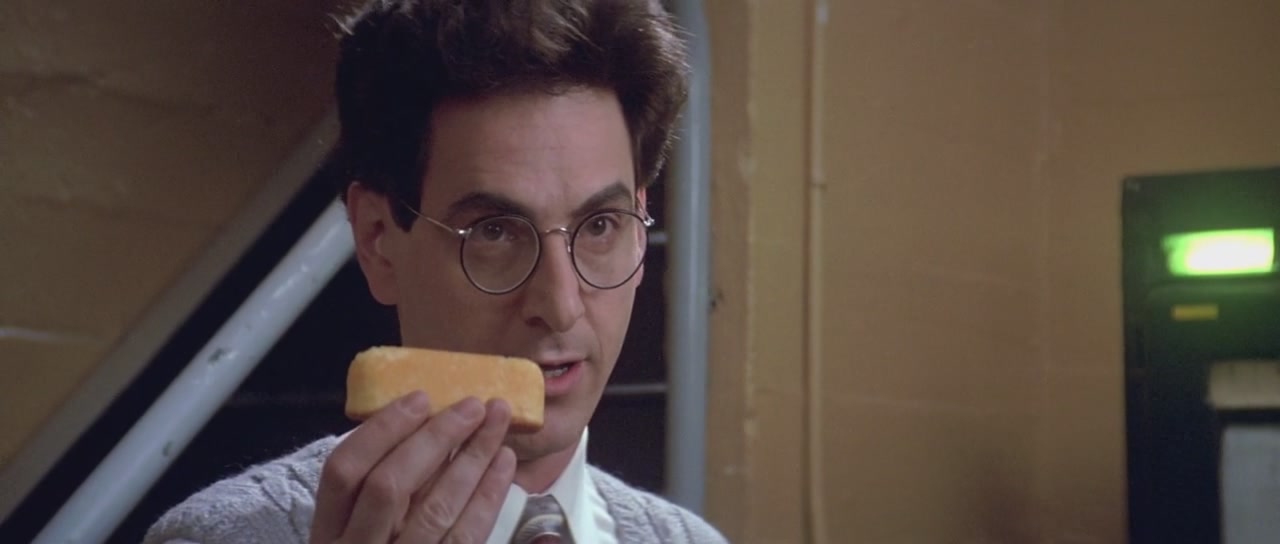
Meanwhile
Dana's situation has evolved. The precise nature of her problem has started to crystallise, which you think she'd be happy about, what with finally having more data to provide to the team so they can really start resolving it.
Unfortunately a minor side effect is that she has been grabbed by terror dogs and hauled into a horrifying unnatural burning plane of existence.
Her neighbour Louis is also dragged into the situation.
Meanwhile
Venkman, arriving at Dana's for their date, discovers that something is going down - she's possessed by Zuul, tranforming into the Gatekeeper. Louis has become Vinz Clortho the Keymaster. Venkman and Egon discuss these events, and realise the they are harbingers of the "something big" Egon was worried about.
Stantz and Zeddemore, driving back from a job, talk about the blueprints for Dana's apartment building - starting to realise it is the epicentre. Zeddemore points out that "something big" might be the End Times. Stakes are raised.
The Man returns
Government moves slowly, but inexorably; once the wheels of the bureaucracy have started spinning, they generate momentum that cannot be stopped. The Ghostbusters get a lesson in government interference: the EPA guy has returned with a cease and desist.
What was an amusing problem of government not grokking tech could be about to kill their business.
Worse, the team knows that their service is already integral to the fabric of the city.
Analogy?
The citizens of New York are completely dependent on the existence of the Ghostbusters (and their containment grid).
It's as if all the taxi drivers in the city had given up in the face of Uber and Lyft, and then the city immediately suspends all "ride sharing" services.
It's a sign
The grid is shut off. Chaos reigns. New York is ravaged by a plague of the supernatural, and, having thrown the Ghostbusters in jail, is currently suffering from a terrible case of vendor lock-in.
We are reminded about the risks of monopolies.
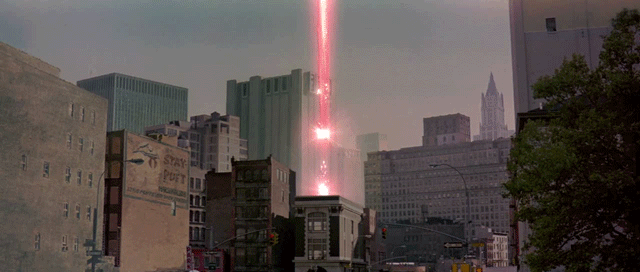
Rock bottom
Things aren't great for the team either. Jailed, business in ruins. They will be cleaning their office for days. Worse, they know that they're going to be stuck fixing this mess.
They expound on new theories, centred around Dana's building.

A break
Finally, some good news. The mayor's asked to see the Ghostbusters, realising that what is going on exceeds the bound of the normal - time for a political hail Mary.
Team Sales Call
The team embark on the sell job of their life. They've got an audience with the mayor, in front of other civic leaders of the city - who admit they've got no idea what's going on. The EPA guy Peck is there, trying to discredit them and get them out of the picture, painting them as responsible for the disaster unfolding on the streets of the city.
Second chance
They know they've only got one chance. Lead by Venkman, the team leaps into action, making an impassioned plea to get the opportunity they need to save the world. Venkman, again demonstrating his acumen as a salesman, knows what buttons to push, eventually scoring the points they need.
The Ghostbusters are back
They head straight to the apartment, hitting the street in full PR mode. The crowd loves them; Venkman performs, knowing that if they succeed this moment will be cemented in the minds of the citizens here. (Of course, if they fail, they'll be dead.)
They tread, slowly and largely vertically, into the unknown.
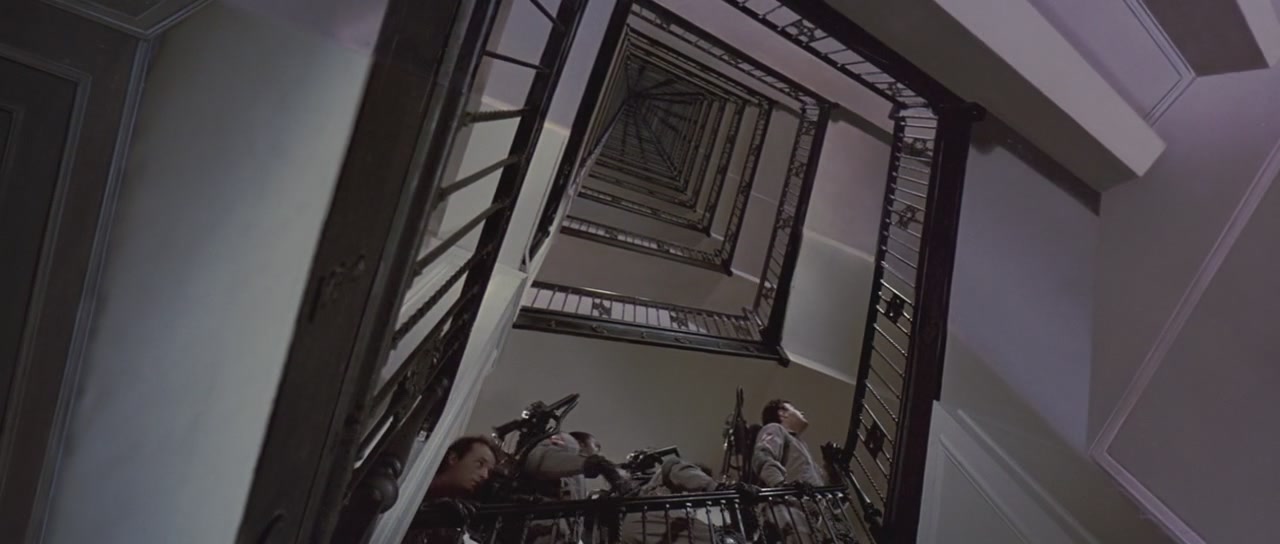
Shifts in the problem space
The team make it to the top of the apartment building just in time to see that the situation evolving rapidly. The Gatekeeper and the Keymaster have formed an unholy union at the summit of spook central. The sky crackles with evil energy; a portal has opened to Gozer's terrible plane of existence.
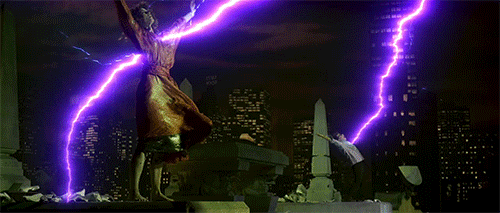
First attempt
The team approach this new situation slowly and carefully. Venkman makes a quick decision and assigns this complicated task to the multi-talented Ray.
Solid management, except Ray makes one small error in judgment: he informs Gozer that he is not, in fact, a god, leading to them all nearly getting thrown off the building.
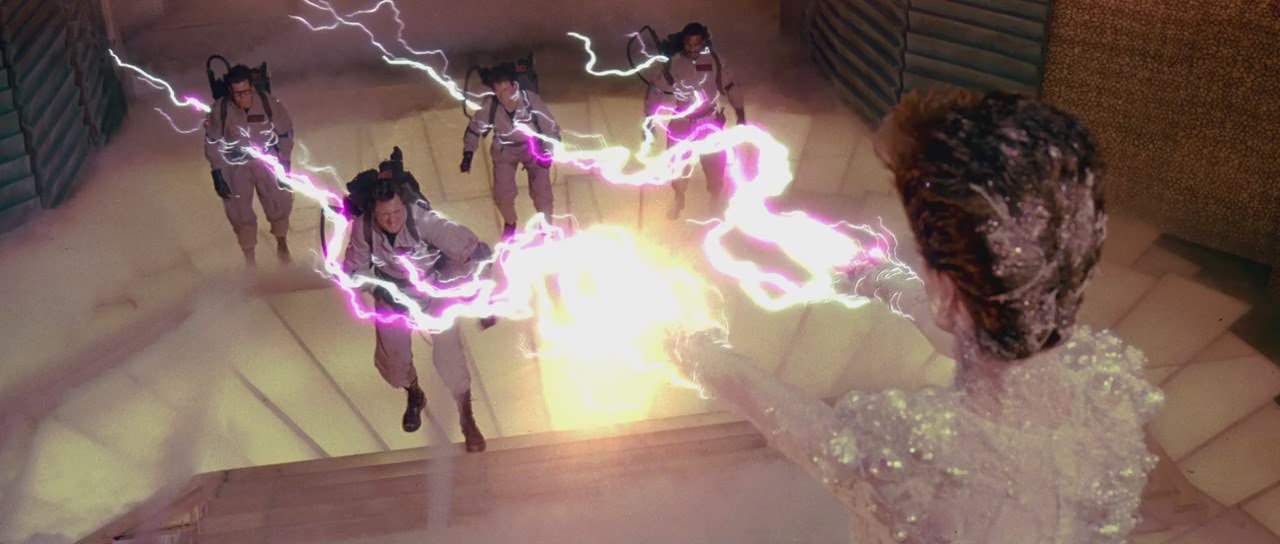
The old fashioned way
The team know how to deal with the supernatural, right? They get on their feet. They unsling their positron colliders with the calm assurance that comes from well-orchestrated practice, routine and experience.
But all for naught.
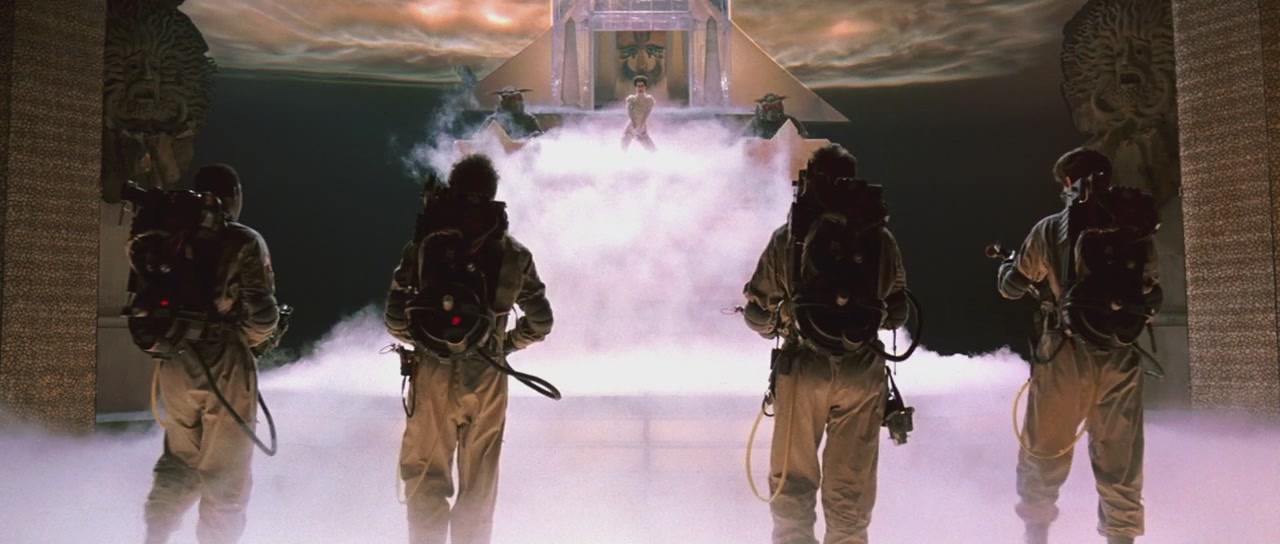
Uh oh
Their usual methodology and client servicing process looks like it worked at first, but Egon - paying attention to the readings he continues to gather while the others declare Miller time - knows it's not over yet.
A voice from the sky speaks, asking them to call forth the Traveller. Ray makes the Choice.
A new challenge
A new challenge appears: a giant Stay Puft Marshmallow man. Nothing in their experience has prepared them to deal with this - an Outside Context Problem like nothing the world has ever seen before.
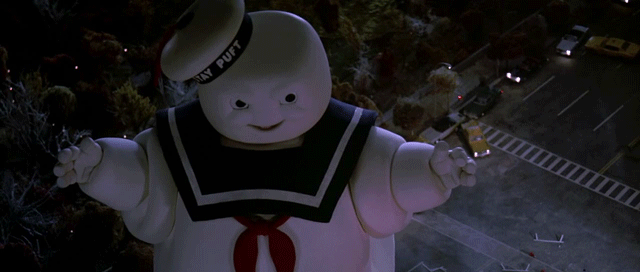
Blast it
Well, they try the usual bag of tricks anyway. Just in case. But it results in them almost catching fire, so they regroup. Rethink. They're running out of time and options, to save their business, their city, their world.
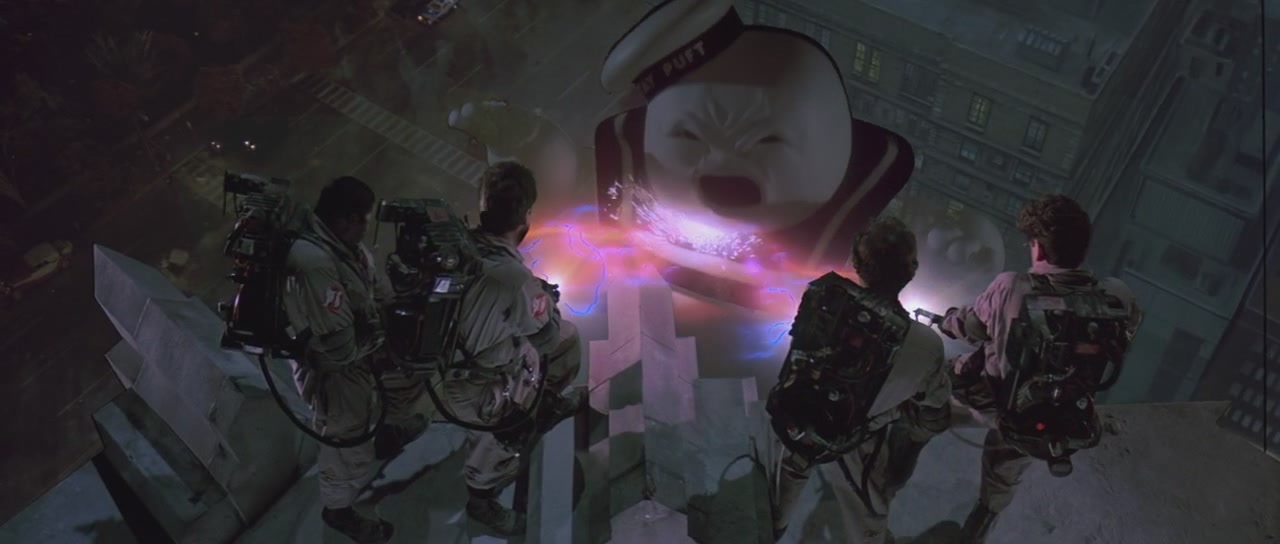
Pivot
And then it happens: the pivot. Egon comes up with a radical new approach: crossing the streams. It defies everything they know, but it could be their only hope.
Success
Success. Not only were the team able to develop a plan to pivot, they were able to flawlessly execute it on the spot.
The team have come through for their long-time client Dana - despite not being able to solve her problem in the early days, they've loyally stuck with her, through good times and the bad.
By keeping her problem on their radar, solved a critical problem at an important time for their enterprise - perhaps opening an entirely new revenue stream.
Their willingness to keep working at problems demonstrates a true startup quality: tenacity.
Winning

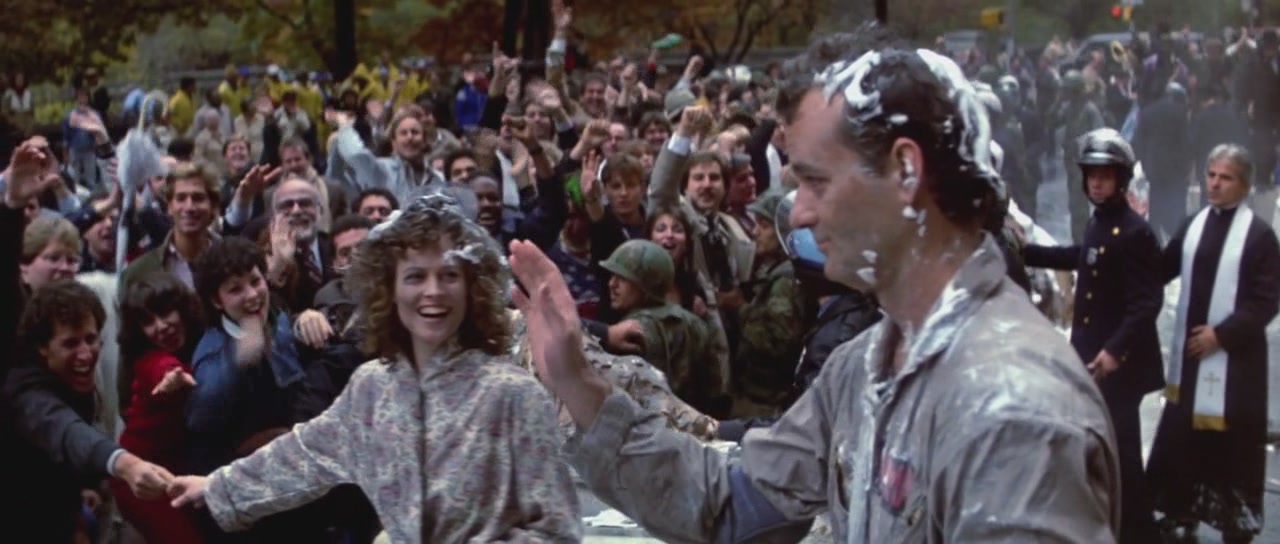
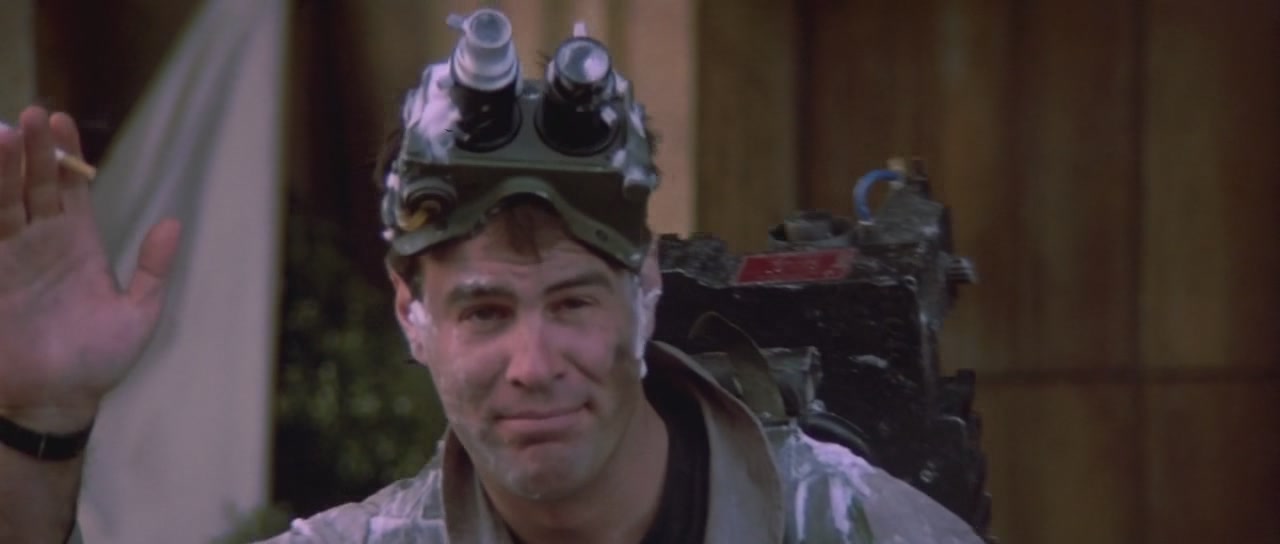
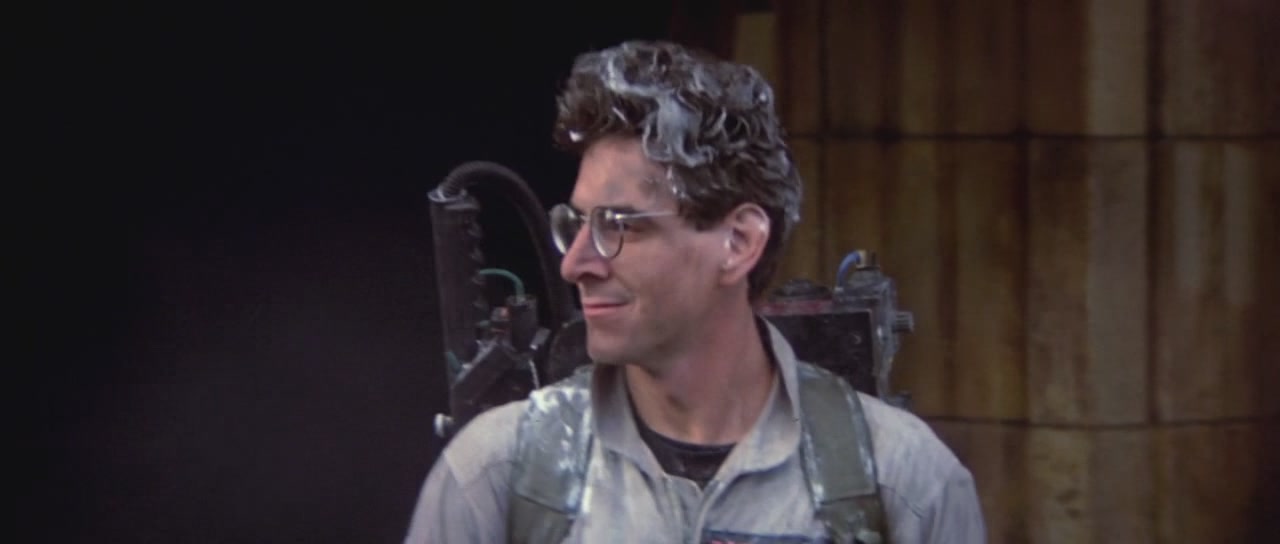
Fin
It's been more than three decades since Ghostbusters first graced us with its presence on the silver screen. It wasn't until recently that I noticed some of the entertaining similarities between the journey of the Ghostbusters and that of any technology startup - an team that has worked together closely for years, a defining moment of realisation, feeling out a business model, struggling to find clients, scaling with success, dealing with sudden shifts in the market... all classic elements of many startup stories.
Fin
The startup stories of those that have gone before can be inspirational. For those contemplating a startup - or those already in one - I hope this slightly different take on Ghostbusters was useful.
